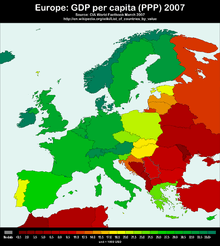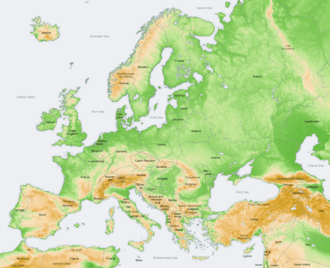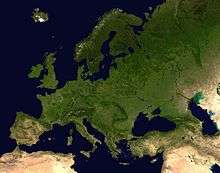Outline of the European Union
The following outline is provided as an overview of and topical guide to the European Union:


The European Union (EU) is an economic and political union of 27 member states, located primarily in Europe.[1][2][3][4] Committed to regional integration, the EU was established by the Treaty of Maastricht on 1 November 1993 upon the foundations of the pre-existing European Economic Community.[5] With 500 million citizens, the EU combined generates an estimated 30% share (US$18.4 trillion in 2008) of the nominal gross world product.[6] The EU has seven principal decision making bodies known as the Institutions of the European Union, while the adoption of laws and coordination of EU policies is the role of the Council of the European Union which currently meets in ten different configurations.
Origins
- History of the European Union
- Ideas of European unity before 1945
- History of the European Coal and Steel Community (1945–57)
- History of the European Communities (1958–72)
- History of the European Communities (1973–93)
- History of the European Union (1993–2004)
- History of the European Union since 2004
- European Communities
- Single market. See also Trade bloc and Value-added tax
- Subsidiarity
- See treaties below
Identity
Structures
_EN.svg.png)
- Members
- Institutions
- Other bodies
- Related Organisations
- European Free Trade Association (EFTA)
- European Economic Area (EEA)
- Western European Union (WEU)
Law and policy

- Treaties of the European Union – Founding and amending treaties (primary legislation)
- Treaty of Paris (1951)
- Treaty of Rome (1957)
- Merger Treaty (1965)
- Single European Act (1986)
- Maastricht Treaty (1992)
- Amsterdam Treaty (1997)
- Treaty of Nice (2001)
- Treaty of Accession 2003
- Treaty of Accession 2005
- Treaty of Lisbon (2007)
- Treaty of Accession 2011
- Related documents
- EU Policy Areas
- Economic and Monetary Union of the European Union (Euro)
- European Political Cooperation
- Common Agricultural Policy
- Common Fisheries Policy
- Regional policy of the European Union
- Trans-European Networks
- Energy
- European Union law
- Forms of Secondary Legislation
- Topics of Secondary Legislation
- Directives and Regulations of Secondary Legislation:
- Societas Europaea
- Protected designation of origin
- Unitary patent
- Registration, Evaluation, Authorisation and Restriction of Chemicals
- Directive on the enforcement of intellectual property rights
- Directive 95/46/EC on the protection of personal data
- Directive on harmonising the term of copyright protection

Miscellaneous

- Economy of the European Union
- European Neighbourhood Policy
- European Union statistics
- Euroscepticism, Europhobe
- European Union Association Agreement
- Pro-Europeanism, Europhiles
- List of cities in the European Union by population within city limits
- Morocco–European Union relations
- Sport policies of the European Union
- United States of Europe
- Trade war
- Statewatch
- Supranational union
See also
- G20
- Outline of Europe
- Outline of Austria
- Outline of Belgium
- Outline of Bulgaria
- Outline of Croatia
- Outline of Cyprus
- Outline of the Czech Republic
- Outline of Denmark
- Outline of Estonia
- Outline of Finland
- Outline of France
- Outline of Germany
- Outline of Greece
- Outline of Hungary
- Outline of Ireland
- Outline of Italy
- Outline of Latvia
- Outline of Lithuania
- Outline of Luxembourg
- Outline of Malta
- Outline of the Netherlands
- Outline of Poland
- Outline of Portugal
- Outline of Romania
- Outline of Slovakia
- Outline of Slovenia
- Outline of Spain
- Outline of Sweden
References
- Jackson, James K. (9 March 2009). "The Financial Crisis: Impact on and Response by the European Union" (PDF). Federation of American Scientists: Congressional Research Service. p. 28. Retrieved 6 July 2009.
The European Union is a political and economic union of 27 member states, formally established in 1993 by the Treaty of Maastricht out of existing structures that had evolved in steps since the 1950s.
- Permanent Mission of France to the United Nations. "What is the European Union?". Archived from the original on 3 March 2009. Retrieved 6 July 2009.
Europe is a geographical and cultural notion. The European Union is a political and economic union among 27 States on the European continent
- "Cabinet statement on German EU Presidency". Regierung Online. Press and Information Office of the [German] Federal Government. 5 November 2006. Archived from the original on 24 December 2008. Retrieved 6 July 2009.
The European Union is a political union...
- "European Union", New Oxford Dictionary of English, Oxford, UK: Oxford University Press, 2001, p. 635, ISBN 0-19-860441-6:"an economic and political association of certain European countries as a unit with internal free trade and common external tariffs...."
- Craig, Paul; Grainne De Burca; P. P. Craig (2006). EU Law: Text, Cases and Materials (4th ed.). Oxford: Oxford University Press. p. 15. ISBN 978-0-19-927389-8.; "Treaty of Maastricht on European Union". Activities of the European Union. Europa web portal. Archived from the original on 21 October 2007. Retrieved 20 October 2007.
- "World Economic Outlook Database, April 2009 Edition". International Monetary Fund. April 2009. Retrieved 24 April 2009.
Gross domestic product, current prices; US dollars, Billions;
2007 = 16,927.173
2008=18,394.115
2009=15,342.908 [projection]
Gross domestic product based on purchasing-power-parity (PPP) valuation of country GDP; Current international dollar, Billions;
2007 = 14,762.109
2008 = 15,247.163
2009 = 14,774.525 [projection]
GDP based on PPP share of world total
2007 = 22.605%
2008 = 22.131% 2009 = 21.609% [projection]
World "GDP", current prices; US dollars, Billions;
2007 = 54,840.873
2008= 60,689.812
2009= 54,863.551 [projection]
These data were published in 2009. Data for 2009 are projections based on a number of assumptions.